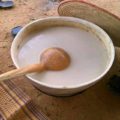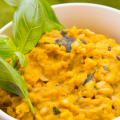Nutrition is about eating a healthy and balanced diet so your body gets the nutrients that it needs. Nutrients are substances in foods that our bodies need so they can function and grow. They include carbohydrates, fats, proteins, vitamins, minerals, and water.
When you’re pregnant, nutrition is more important than ever. You need more of many important nutrients than you did before pregnancy. Making healthy food choices every day will help you give your baby what he or she needs to develop. It will also help make sure that you and your baby gain the proper amount of weight.
Fura da Nunu translates to Millet and Milk. Nono is locally fermented milk with a consistency that is thick but isn’t quite as thick as yogurt. Traditionally, the vendors mold the fura into a ball and it’s mashed into the milk just before serving. This is a nifty trick as it gives the vendors an opportunity to sell two distinct products. The homemade fura da nono recipe can easily be prepared using plain yogurt or kefir milk, with a simple millet ball that will be incorporated into the milk. Fura da nunu in Hausa is millet and milk in English. In this article, we will look at the several health benefits of fura da nono during pregnancy.
Health Benefits Of Fura Da Nono Drink During Pregnancy
- This drink is highly nutritious
Fura da nono is packed full of vitamins and minerals such as vitamin B5, B-12, riboflavin, potassium, zinc, and phosphorus vital for optimal body functions. Your growing baby needs these for the development of just about every part of their body. Folate intake significantly reduces the risk of having a baby with spina bifida. These foods supply energy for your baby’s development and help build the placenta and other tissues in your body. Vitamin B12 is important for maintaining the health of your nervous system, but it’s also believed that when combined with folic acid during pregnancy, B12 supplements can help to prevent spina bifida and other spinal and central nervous system birth defects in your baby.
- Fura aids good digestion and also prevents constipation
Constipation is a common problem during pregnancy, up to half of pregnant women get constipated at some point. One reason for constipation during pregnancy is an increase in the hormone progesterone, which relaxes smooth muscles throughout the body, including the digestive tract.
This means that food passes through the intestines more slowly. And the problem may be compounded later in pregnancy by the pressure of your growing uterus on your rectum. Iron supplements, especially in high doses, can make constipation worse. Fura da nono is rich in dietary fiber, soluble fiber allows more water to remain in your stool, making waste softer, larger, and thus, easier to pass through your intestines. Insoluble fiber adds bulk to your fecal material, which hastens its passage through your gut and prevents that constipated feeling.
- Relieve Migraine and Prevent Premature labor
Hormone changes during pregnancy are not the only thing that can trigger migraine headaches. Most women have a combination of triggers. For instance, stress, skipped meals, and lack of sleep may all trigger a migraine. And something that triggers a migraine one day may not bother you at all the next.
Millet from which fura is made relieves the effect of migraine and reduces the risk of a heart attack because of the content of magnesium in it. Deficiency in this mineral during pregnancy may increase the risk of chronic hypertension and premature labor. Some studies suggest that supplementing with magnesium may reduce the risk of complications like fetal growth restriction and preterm birth. SEE: Effects and Benefits of Kunu Drink During Pregnancy
- Good Source Of Protein And Calcium
Nono drink which is the milk part of fura is a good source of protein while the calcium in milk helps in building strong bones. Experts recommend 75 to 100 grams of protein per day. Protein positively affects the growth of fetal tissue, including the brain. It also helps your breast and uterine tissue to grow during pregnancy, and it plays a role in your increasing blood supply.
If you do not consume enough calcium to sustain the needs of your developing baby, your body will take calcium from your bones, decreasing your bone mass and putting you at risk for osteoporosis. Pregnancy is a critical time for a woman to consume more calcium and fura da nono is an excellent source. SEE: List of Healthy Nigerian Foods Rich In Calcium
How to make Fura da nono recipe
Ingredients
1 cup of millet
2 tablespoons of cornflour (ground)
1 teaspoon of dry ginger root
½ tablespoon of alligator pepper
1-liter nono (plain yogurt or kefir milk)
Sugar to taste
Ice cubes
Method of preparation
Wash and soak the millet for like 5-10 minutes before grinding, this makes it softer and easier to blend, though you can use dry grounded millet and still achieve a good result.
Blend all ingredients together with a cup of water, after that, pour into a pot and cook on medium heat till the millet thickens and forms a dough.
Remove from the pot as you mold it into a small round ball; finally, sprinkle the corn flour over the balls as it helps keep them moist and fresh.
In a bowl mash the fura (millet) and pour in the nono either plain yogurt or kefir milk (nunu) and mix very well, then add sugar to taste.
Do I have any special nutrition needs now that I am pregnant?
You need more folic acid, iron, calcium, and vitamin D than you did before pregnancy:
Folic acid: is a B vitamin that may help prevent certain birth defects. Before pregnancy, you need 400 mcg (micrograms) per day. During pregnancy and when breastfeeding, you need 600 mcg per day from foods or vitamins. It is hard to get this amount from foods alone, so you need to take a supplement that contains folic acid.
Iron: is important for your baby’s growth and brain development. During pregnancy, the amount of blood in your body increases, so you need more iron for yourself and your growing baby. You should get 27 mg (milligrams) of iron a day.
Calcium: calcium during pregnancy can reduce your risk of preeclampsia, a serious medical condition that causes a sudden increase in blood pressure. Calcium also builds up your baby’s bones and teeth. Pregnant adults should get 1,000 mg (milligrams) of calcium a day.
Vitamin D: helps the calcium to build up the baby’s bones and teeth. All women, pregnant or not, should be getting 600 IU (international units) of vitamin D per day.
Keep in mind that taking too much of a supplement can be harmful. For example, very high levels of vitamin A can cause birth defects. Only take vitamins and mineral supplements that your health care provider recommends.
You also need more protein when you are pregnant. Healthy sources of protein include beans, peas, eggs, lean meats, seafood, and unsalted nuts and seeds.
Hydration is another special nutritional concern during pregnancy. When you are pregnant, your body needs even more water to stay hydrated and support the life inside you. So it’s important to drink enough fluids every day. READ: List Of Nigerian Food To Eat During Pregnancy
How much weight should I gain during my pregnancy?
How much weight you should gain depends on your health and how much you weighed before pregnancy:
- If you were at a normal weight before pregnancy, you should gain about 25 to 30 pounds
- If you were underweight before pregnancy, you should gain more
- If you were overweight or had obesity before you become pregnant, you should gain less
Check with your health care provider to find out how much weight gain during pregnancy is healthy for you. You should gain the weight gradually during your pregnancy, with most of the weight gained in the last trimester. See: Zobo Drink and Pregnancy






